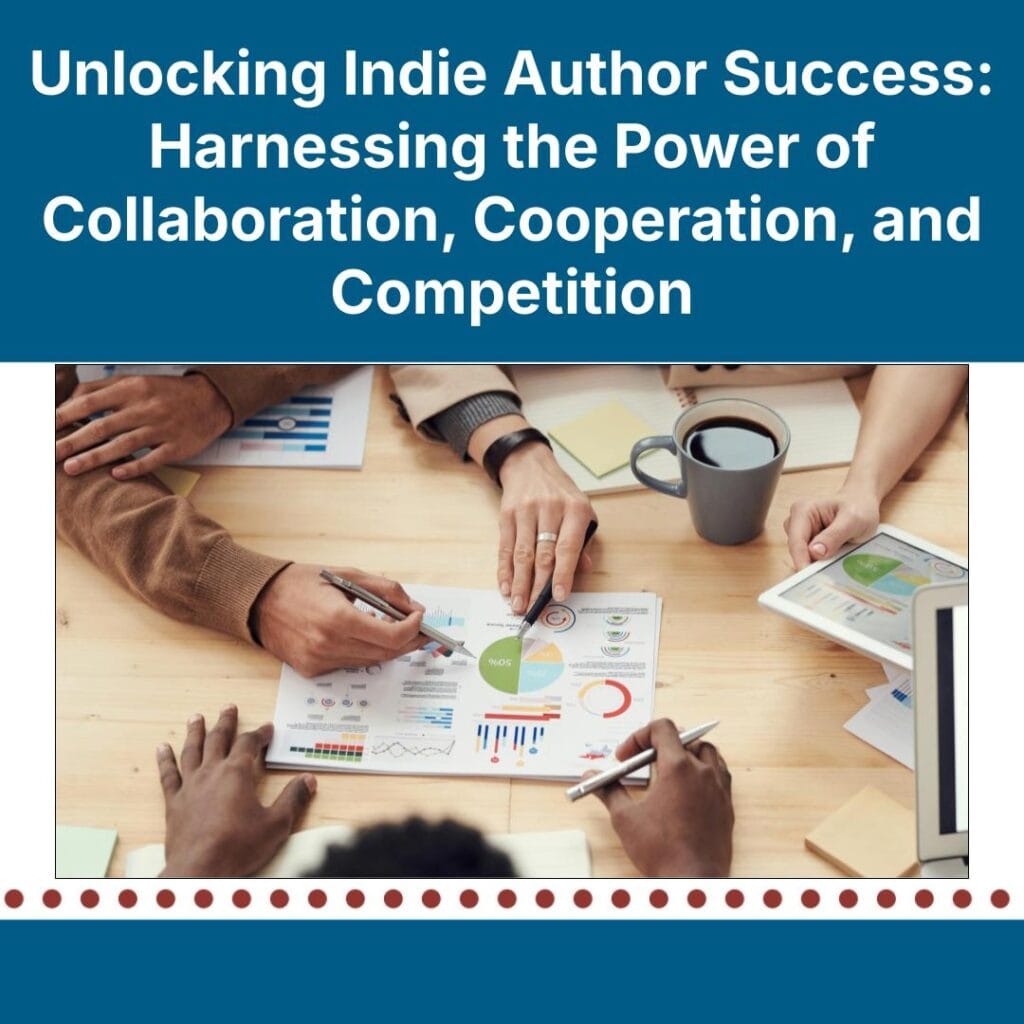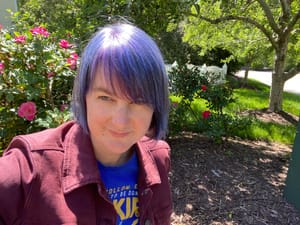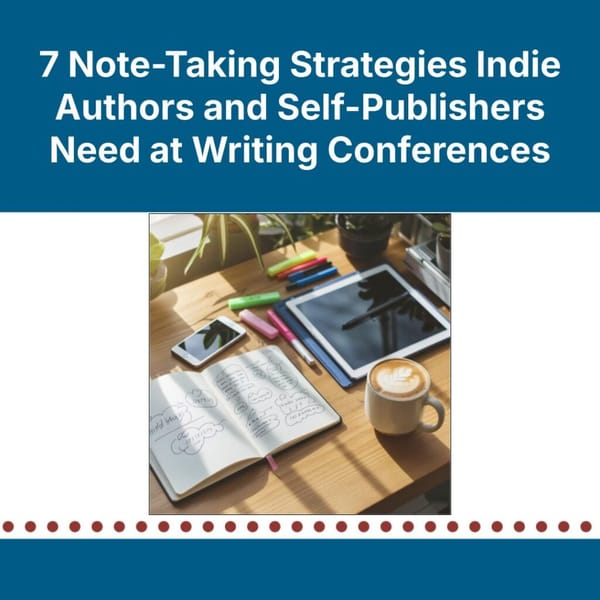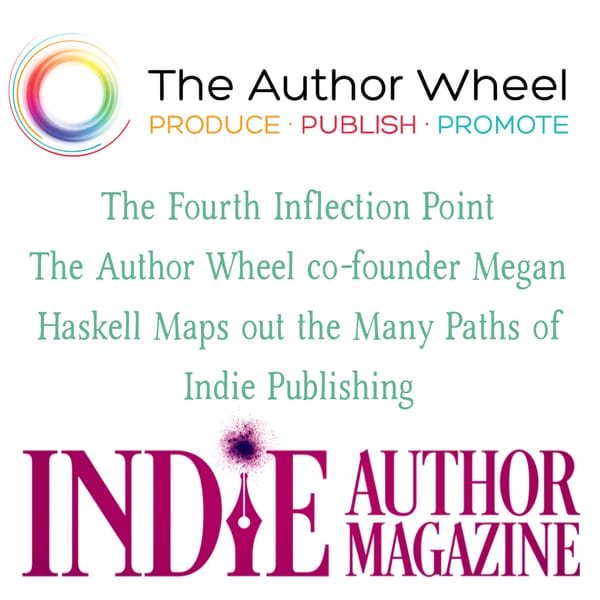The Power of Partnership
Writing is a solitary game—yet it’s not. Although authors can create alone, they need others to make it work, even if it’s only their readers. Many of us use editors and beta readers, critique groups, Mastermind-type groups, social media connections, and many other ways to connect with people within the publishing industry. And even those of us who manage it all ourselves rely on our relationships with our readers to make this career possible.
Creators have collaboration, cooperation, and competition baked into the gig. These three C’s can lead to a more shared workload, access to a larger, more varied audience, inspiration, and increased creativity. As the authors below share, collaboration, cooperation, and competition are different, but each is important to an author’s career—and important to prioritize in different ways as your career grows in the new year and beyond.
Collaboration
Collaboration means working together to create something. For authors, that may mean bringing minds together in an initial high-level brainstorm, working together in a shared world or anthology, or co-writing an entire novel. Everyone does collaboration slightly differently, but it is key for many creators.
For author Jilleen Dolbeare, co-writing as a form of collaboration allows for authors to foster friendships with one another. “Writing is lonely,” Dolbeare writes. “It's great to have author friends to bounce ideas off of, help with blurbs, help with promos … Co-writing is the best form of collab. I've done [it] and I adore it.”
Contrast that with J. Clifton Slater, who sees the chance to work alongside other creatives and discuss the indie publishing industry as “invaluable.” “I am a stoic writer,” Slater writes. “Just the idea of working closely with another author melts my soul.”
Author Lee Ann thinks of collaboration as a way “to lift each other up … [and] to be there to brainstorm, without the worry that someone is going to take your idea and use it for themselves.” Ann writes that it also allows authors to “offer suggestions and support” to one another.
Cooperation
Cooperation means mutual support without the project. Whereas collaboration may involve authors working together on an anthology or other project, cooperation allows authors to share advice with one another and encourage them in their journey, such as with beta reads, promotions, and social media support.
“Cooperation is the opportunity to create community among other authors in a genre or between genres,” writes author Jamie Davis. “We do this through in-person and online conferences and in those occasions where authors swap one-off shares of their work without a more formal collaborative marketing effort.” We’ve all seen people supporting each other’s crowdfunding campaigns, pulling together when someone is sick, or offering advice freely and generously. Working together in this way gives each side of the equation necessary support and strengthens ties.
“Collaboration and cooperation is easy when you admire your peers so much,” writes author Lauretta Hignett. “I've made the best friends in this industry by shamelessly fangirling [over] my contemporaries.”
Although conferences and swaps are a good way to find people with whom you can work, you can also form partnerships through other channels. For example, many authors find a fantastic beta reader can drive significant traffic to their work. Working with professionals, like a cover designer, editor, or marketing professional, can also be essential to an author’s career.
As author Iris Beaglehole writes, “Sharing, collaborating, and connecting other authors with our readerships is mutually beneficial as we all can benefit from more wonderful books in our lives.”
Competition
Competition is a word that can have negative connotations, especially when pulling yourself up in a community could mean pushing others in the same space down. As writer Karen Landry writes, “We may be friends and we may be working together, but behind the scenes, we're probably bidding against each other on that same Amazon/FB real estate.” But Landry doesn’t see competition in the indie author community extending far beyond online algorithms.
Author Pamela Kelley agrees. “I don't believe that there really is competition in writing,” she writes. “That would imply that readers will only choose one book—and that isn't the case. They want all the books.” Instead of competing with others, Kelley believes an author’s true competition is with themselves. “Can you improve so that your books stand out? I have always been inspired by authors that are top sellers as it shows me what is possible.”
“THAT is the kind of competition I love and that's what I embrace. I dislike the rest. I am only competing against where I was last week, last month, last year,” Audrey Hughey agrees.
Jessa Slade doesn’t believe competition exists among authors either, writing that she never hesitates to buy a new book simply because there are others on her shelf. “Since story value is such a subjective experience,” she writes, “I think competition is most practically a problem of signal to noise rather than author versus author.”
Author Russell Nohelty echoes Slade, saying, “I think we are in competition mostly from other forms of media and irrelevance more than we are in competition with other authors.”
“I love it when my books rank well,” Kristen Gandy writes. “But this doesn't mean I'm not cheering for my friends when their books knock mine off the top spot. Competition means my friends are on my team, and when they do well, I do well.”
Building a Strong Community
Creating and publishing comes with numerous challenges, but fostering a strong, supportive community is immensely valuable when facing those challenges. As author Lynn Morrison writes, “We're seeing more authors leaning in with their strengths to help someone else, and in return, filling a gap in their own capabilities … There is so much knowledge within our industry, we would be smart to find ways to tap into it.”
Blending collaboration, cooperation, and competition with peers, professionals, and readers will enable you to contribute to and reap the benefits of your community. As you set resolutions and plans for the upcoming year, consider how you can center the need for community in your plans.
- Reach out via social media, in the back matter of your work, in a promotion you heard about, or at local in-person groups. Getting into situations where you can interact and become part of a community is key.
- Offer to help where you can—not to the point of overwork but so that you’re able to use your situation and strengths to contribute to the community. Volunteer for a conference, help raise up a new author’s visibility, or offer to admin an online forum.
- Create shared or community goals to encourage one another and foster support for your peers. Maybe a group wants to do an anthology, or a round robin in newsletters will allow you all to grow your businesses. You can suggest something if nothing is being tossed around.
- Balance collaboration and competition, and be sure your biggest competition is always yourself.
Writing can be done alone, but it doesn’t have to be lonely. As you’re setting goals for the new year, remember the importance and benefits of connecting with others. We’re all in it together.
Jen B. Green













